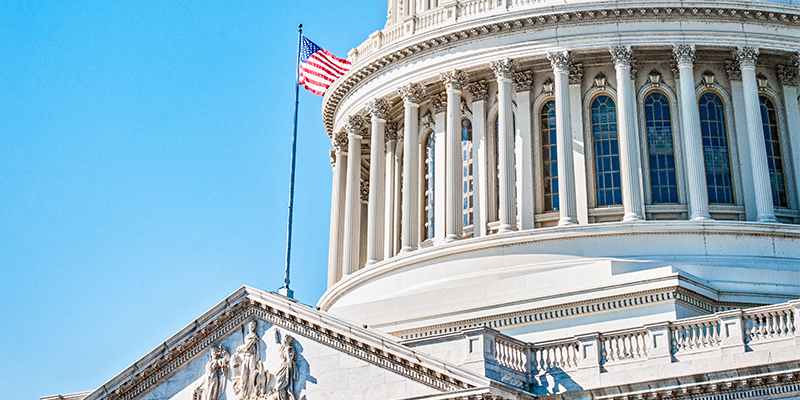Usually at this time of year, members of Congress and advocates for industry are strategizing on how best to position their tax priorities for inclusion in a year-end tax package. In many instances, success has depended on a tax title becoming part of a massive, must-pass omnibus spending bill that comes together in December, when senators and representatives desperately want to get home for the holidays.
But this time could be different. While fighting in Congress over spending bills is nothing new, the heated politics surrounding this year’s federal government funding battle, and the resulting animosity if a government shutdown does materialize, could linger well beyond October and make reaching agreement on a tax bill all the more challenging.
The Tax Cuts and Jobs Act (TCJA), which was passed in 2017 during the Trump administration, added various tax credits and deductions, and made changes to depreciation, expensing and other tax provisions that affect businesses. Many of these provisions have expired or are expiring in the coming years, or are being gradually phased down. Businesses would like to see them extended. Others are tax provisions which the business community wants to change. Tax provisions expiring in 2024 or 2025 are less likely to be dealt with this year, but House Ways and Means Chairman Jason Smith (R-MO) has introduced legislation restoring and extending provisions that have expired this year and revising some unexpired provisions based on industry input. These include:
- Extending 100% bonus depreciation: Bonus depreciation (full and immediate expensing) was provided by TCJA for certain capital investments that normally would have been depreciated over a scheduled period of years. However, TCJA provided for a yearly phasedown of bonus depreciation of 20 percentage points starting in 2023. The introduced bill would not phase down bonus depreciation, keeping it at 100% through 2025.
- Reinstituting Full Expensing for Research and Development (R&D): TCJA modified the treatment of R&D costs beginning in 2022, from full and immediate expensing (which allows a business to recover its costs quickly) to spreading out recovery of those costs over five years. The House legislation would make full expensing retroactive for 2022 and extend it through 2025.
- Interest Deductibility Provisions: TCJA restricted the deductibility of the interest paid by businesses on their debt, which became more stringent beginning in 2022. The Republican legislation would restore the more favorable allowances allowed under the TCJA from 2018 to 2022.
These business-backed provisions enjoy broad bipartisan support for the most part, and normally could become part of an omnibus spending package if the Republican bill enjoyed the support of the majority of the House. At that point, elements of the legislation would be negotiated with the Democratic-led Senate, and a compromise measure would be added to a must-pass omnibus spending bill.
But a number of Republicans from high-tax states are refusing to support the legislation unless it lifts or substantially increases the cap on the state and local tax (SALT) deduction that was created by TCJA. For vulnerable Republicans from New York, New Jersey and California, whose constituents saw their taxes increase because of the cap, the SALT issue is of paramount political importance. Conservative Republicans from relatively low-tax states, however, oppose lifting or eliminating the cap. Some progressive Democrats also oppose lifting the cap because the benefits largely accrue to wealthier taxpayers and is contrary to their goal of reducing income-inequality. For the time being, the unresolved SALT issue is preventing House Republicans from building momentum for their tax package.
Democrats in the House and Senate have also stated they will not support adding any tax legislation to a year-end package unless it also restores the higher levels for the childcare tax credit that were put in place for 2021, during the COVID-19 pandemic. Making this temporary expanded child tax credit permanent would be extremely costly, increasing federal government costs by an estimated $1.6 trillion over 10 years. The Biden administration has proposed a three-year extension of the expanded child tax credit at a lower but still substantial cost.
Other tax priorities will be taken into consideration, including efforts to include a NAIOP-backed adaptive reuse tax incentive, incentives to increase the supply of affordable housing, and other tax measures that advocates for business hope will catch a ride on the omnibus. These year-end tax negotiations are often brutal, with some worthy policies not included because of costs or lack of bipartisan support, which is crucial. But the opportunity to get their tax priorities onto a must-pass omnibus spending bill usually helps acts as a catalyst to forge consensus on a tax bill.
This year, because of the acrimony of the spending debate, an omnibus bill may not be an option, reducing any pressure to make difficult compromises that would otherwise occur. In that case, passing a bipartisan tax measure becomes much more challenging. What happens over the coming weeks on government spending will set the stage for what happens on tax legislation in December.








